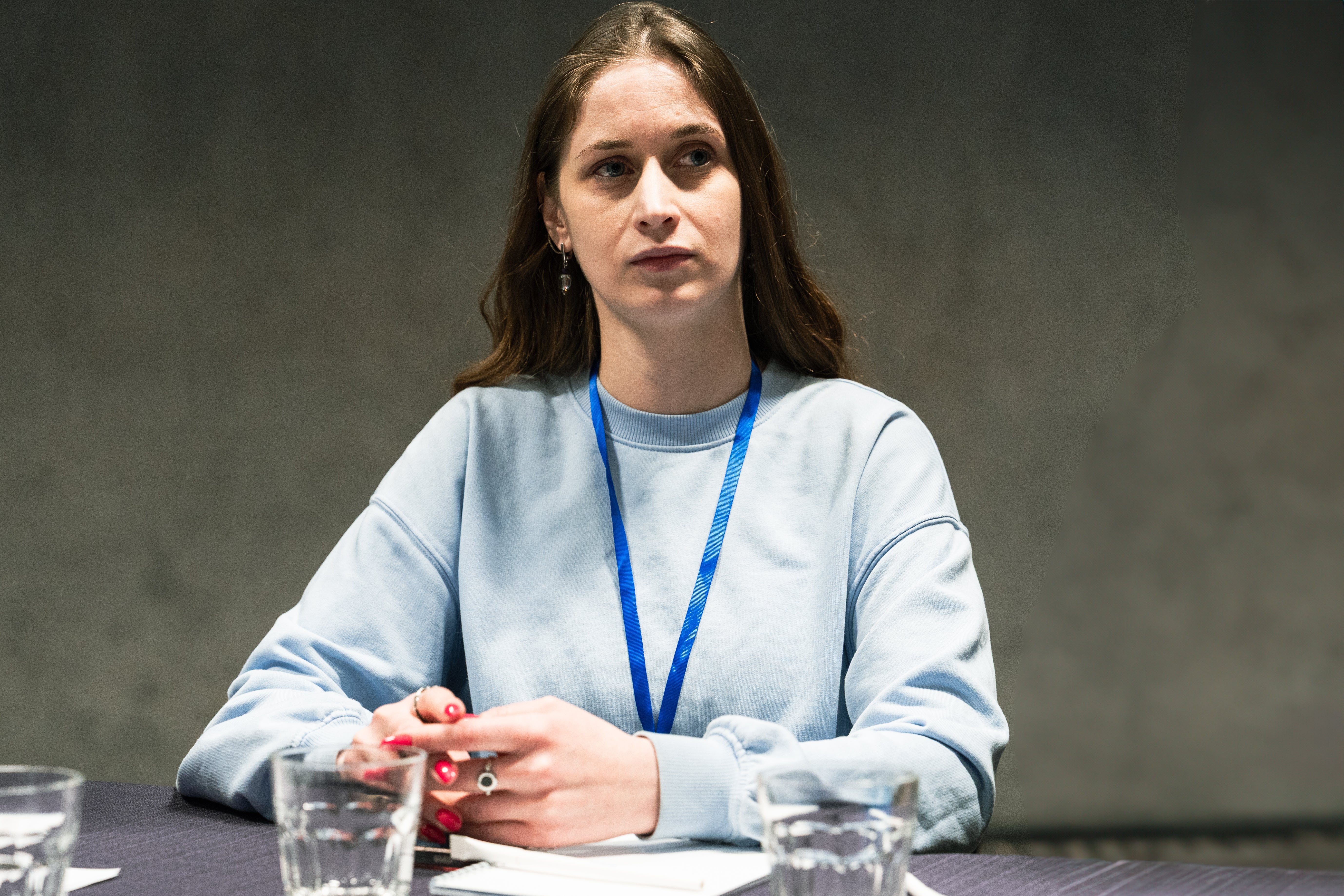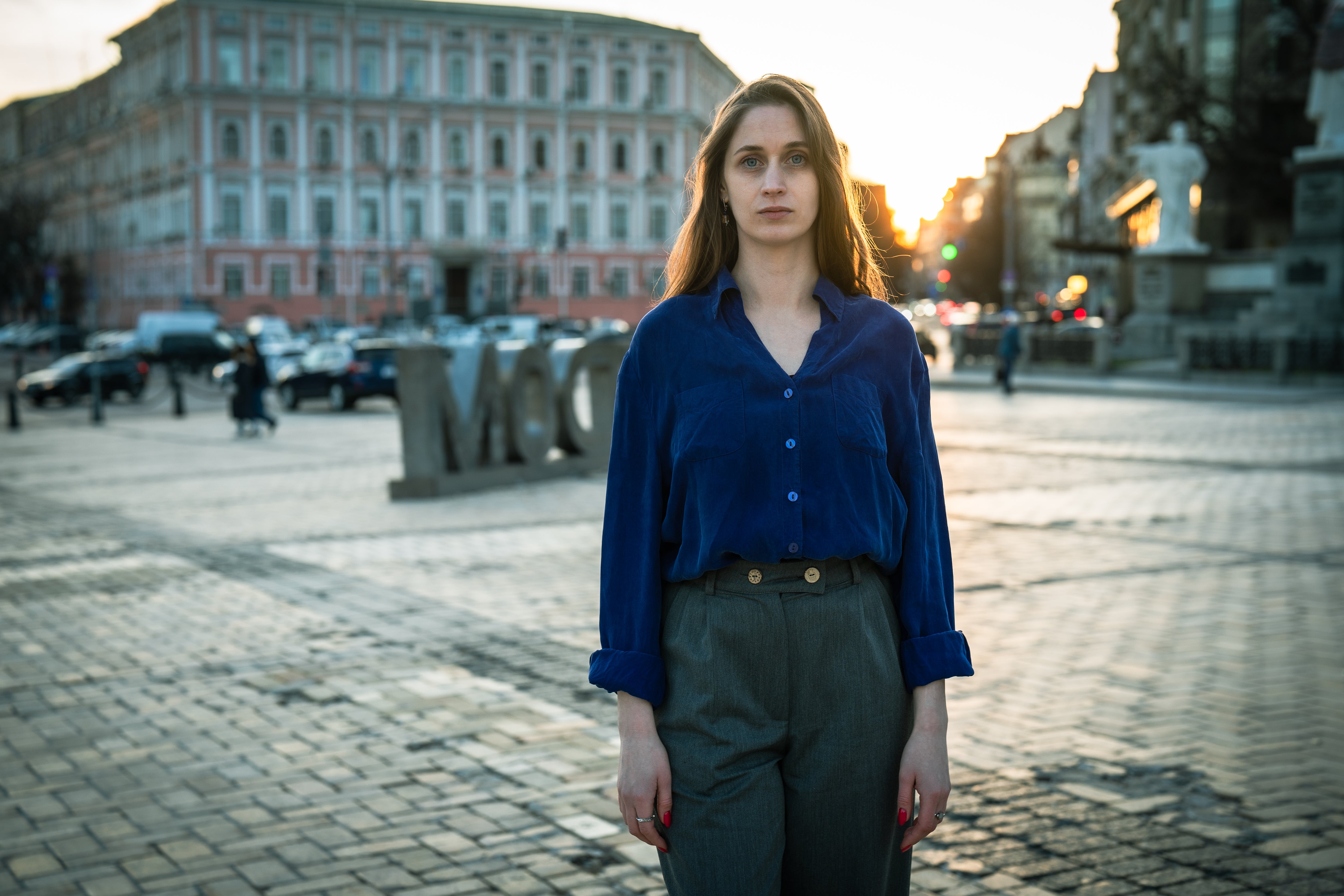Daria Zymenko: For me, interim reparations are primarily about restoring trust
Date:

Photo: Zborovska Oleksandra
UN Women has been actively supporting the joint efforts of the Ukrainian government, civil society, and international partners to address conflict-related sexual violence, particularly in the context of Russia's full-scale war against Ukraine. This includes active involvement in the development of the Law of Ukraine “On Legal and Social Protection of Survivors of Sexual Violence Related to the Armed Aggression of the Russian Federation against Ukraine and Provision of Urgent Interim Reparations”, which was adopted in 2024.
Survivors have begun receiving the first urgent interim reparations through a pilot project by the Global Survivors Fund. We spoke with Daria Zymenko about her experience of receiving reparations.
Daria Zymenko combines art and activism in her work. In her creative projects, Daria explores personal and socially significant topics, including sexual violence and its consequences.
She is also a member of the NGO “SEMA Ukraine”, which brings together women who have experienced sexual violence in captivity or during the occupation, a speaker, and participates in conferences and advocacy events.
You had access to interim reparations through the Global Survivors Fund's pilot project for survivors of conflict-related sexual violence. How did you learn about this project?
I learned about it from the “SEMA Ukraine” CSO, specifically from Iryna Dovhan and Liudmyla Huseynova.
Since this is a pilot project, our organization was actively involved in its development and in discussions on key issues—such as the needs of survivors, the required budgets, and potential funding sources. While we cannot influence the sources of financing now, it was still an important topic for discussion.
What was the process like personally for you?
My personal experience with this process was quite comfortable and easy to understand. The procedure was not overly complicated—I had to fill out an application, and there was also a counseling questionnaire conducted by a female psychologist.
A key aspect was the highly sensitive approach. There was no pressure to share unnecessary details, and I was able to provide only the information I felt comfortable disclosing. The questions were framed in a way that helped assess the survivors' situations without causing discomfort or distress.
Overall, I found the process to be attentive and ethical. The psychological support provided by the psychologist was professional and respectful.
What influenced your decision to start this process?
In 2023, I began speaking openly about my experience at conferences and in interviews. It’s certainly not always easy, especially the first time you share your story.
However, speaking out on such topics remains the exception rather than the rule. It is incredibly difficult for many women to make this decision, and I firmly believe that no woman should feel obligated to speak if she is not ready.
For me, public advocacy has become a form of therapy. It’s easier for me to express myself than to keep everything inside. While such openness comes with its challenges, it has also helped me process and cope with my experiences. But this is just my journey—everyone has their own path.
What was the role of “SEMA Ukraine” in launching the interim reparations project?
Iryna Dovhan, the founder of the organization, has been the driving force behind this process. When she established the association in 2019, she may not have fully realized the extent of its future impact—both on society and on the development of support for survivors.
Through her efforts in engaging with international organizations, legal structures, and civil society, she has helped bring conflict-related sexual violence into public discourse, breaking the silence and reducing stigma. Thanks to her persistence, support mechanisms for survivors have been created, including the opportunity to receive interim reparations.
This organization holds deep personal significance for me. Its support has allowed me to connect with other women who have had similar experiences. This community has become a foundation for me, giving me the strength to continue my work, speak out publicly, and advocate for the rights of survivors.

Photo: UN Women/Ksenia Nevenchenko
Based on your experience with interim reparations, what do you think effective reparations for survivors should look like? What aspects should they cover, what should be considered to achieve positive results?
This is a deep, multi-faceted issue that requires a comprehensive approach.
In my view, reparations should come from Russia, as it bears responsibility for the harm and losses inflicted—both physical and material, as well as the psychological consequences. However, we understand that achieving this is either impossible or extremely difficult at this time. That is why interim reparations exist, with international financial institutions stepping in to support the process.
It is crucial to emphasize that reparations are not merely charitable aid from NGOs or donors. They must be legally recognized compensation from the offending state.
Determining the form and amount of compensation is complex. Human losses and psychological trauma cannot be quantified in monetary terms. Survivors of conflict-related sexual violence, in particular, require long-term support, including access to psychological care and therapy, as trauma can have lifelong effects. Additionally, the needs of survivors’ families must be considered, as the impact of trauma extends to loved ones—partners, children, and relatives.
Survivors also need legal and medical assistance, including access to legal support and necessary treatment. Another critical component is compensation for material losses, as many survivors have lost their homes, property, or means of livelihood due to Russia’s war.
Therefore, reparations must be holistic, covering not only financial compensation but also ensuring access to medical, legal, and psychological services. Ideally, a clear and structured system should be developed to address all these aspects.
When it comes to interim reparations, I had no specific expectations—only gratitude that such a mechanism exists. It provides a sense of support and reassurance that survivors are not left alone with their trauma, that they are seen and cared for.
For me, this is not just about financial compensation; it is about trust in society. When initiatives like this are in place, they foster a sense of justice, even if it is not yet fully realized. It sends an important message: survivors matter, their experiences are acknowledged, and there are people and organizations willing to stand by them.
In the context of the ongoing war and the crimes committed by Russia, how important is the law on reparations and what do you expect from its implementation?
For me, interim reparations are primarily about restoring trust. I can understand what Iryna Dovhan feels —she fought for a long time for Ukraine’s right to financial support, and many doubted that it was even possible.
In the beginning, there was a lot of distrust—a sense of being abandoned, of feeling like no one cared. Many believed that real support simply wouldn’t come. So when I and other women received these payments, it was, to some extent, a surprise—a moment that restored my faith that we were seen and heard.
Of course, the process itself was challenging, but this experience gave me a deep sense of visibility and support. And to me, that is the most important thing. Financial assistance is crucial, but more than anything, I value the trust it rebuilt—the understanding that we are not alone, that there are people and organizations genuinely willing to help.
Do you think there is a sufficient level of understanding of the issue of sexual violence in society, in particular during the war? What do you think should be changed to make the public dialog on this topic more effective?
I feel a lot of support in my social environment. When I first started talking openly about my experience, I was pleasantly surprised by how many people supported me. I expected different reactions, because this topic remains very sensitive and taboo.
From what I see and hear in conversations, the general level of understanding of this problem is quite high. But, of course, the situation varies depending on the environment.
For example, in big cities, including Kyiv, where I live, this topic is perceived slightly differently - there is more openness and understanding. But in small communities or villages, as the experience of communicating with women shows, the situation is more complicated. A kind of “everyone knows about everyone” mentality prevails there, and this creates additional pressure on survivors. Often they face condemnation or blame, such as “it's your fault” or “why did you go there?”
Therefore, while the overall level of awareness and support is growing, it is important to continue to work with society, especially in small communities where the topic of wartime sexual violence remains highly stigmatized.
You combine your activities at “SEMA Ukraine” with your artistic practices. How does artistic expression help you to process your experiences and overcome the consequences of trauma?
Art projects and creativity in general help me a lot in the process of comprehending what I have gone through. It's a way of self-expression and reflection that allows me to realize what happened more deeply. Of course, working with psychologists and communicating with friends and family also plays an important role, but the art allows me to analyze and process my experiences on a deeper level.
In addition, through art I can speak to a wider audience. It's a kind of international language that helps to convey the emotions, experiences, and problems that Ukraine is facing.
With regard to the topic of sexual violence, art gives me the opportunity to talk about my experiences visually, figuratively and symbolically and draw attention to this problem. It's a way to speak to society, not only with words, but also through visual, emotional and conceptual images.
UN Women seeks to promote reparations processes through various initiatives, including the Serendipitous Events initiative. Could you share your experience of participating in this initiative?
The Serendipitous Events initiative has become a very important experience for me. Its idea - support and visibility of women in art and science - is extremely relevant.
For me personally, participating in this initiative was interesting and profound, as I had the opportunity to meet many prominent women-artists, scientists-and share this common interaction with them.
It was not only a creative process, but also an important communication, exchange of experience and inspiration. I believe that the result of this project was truly valuable and meaningful.

Photo: Zborovska Oleksandra
This publication was prepared within the framework of the UN inter-agency project “United Action to Empower Survivors of CRSV” with the support of the UN Action Against Sexual Violence in Conflict Network, implemented by UNFPA, the United Nations Population Fund, and the United Nations Office on Drugs and Crime (UNODC), United Nations Development Programme (UNDP), World Health Organization (WHO), UN Women and International Organization for Migration (IOM) in cooperation with the Government Commissioner for Gender Policy (beneficiary of international technical assistance) and the Office of the Vice Prime Minister for European and Euro-Atlantic Integration